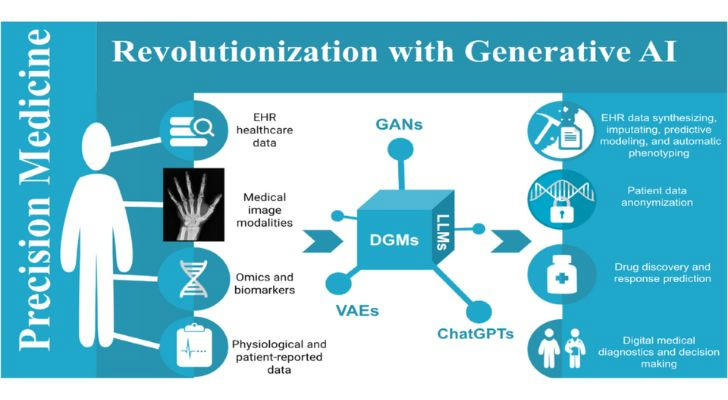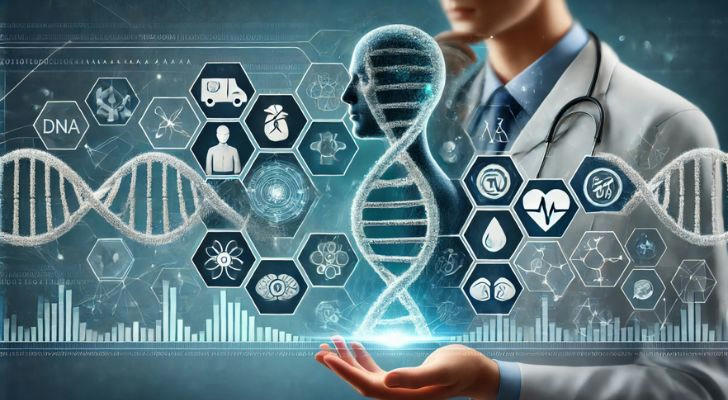Personalized Medicine: How to Make Your Treatment More Precise?
In today’s world, not all treatments work the same for everyone. You’ve probably noticed that some people get better results from treatments than others, even when they’re receiving the same medication or therapy. But what if the way we treat patients could be tailored to fit their unique genetic makeup and lifestyle? This is where personalized medicine comes in—offering more precise, individualized treatment plans based on each patient’s needs.

Let’s dive into what personalized medicine really is and how it’s transforming healthcare
What is Personalized Medicine? 🩺
Personalized medicine, also known as precision medicine, is an innovative approach that uses information about a person's genetic profile, environment, and lifestyle to create more effective treatments. It’s about treating people as individuals, not as one-size-fits-all patients. The goal is to select the best treatment plan based on a person’s specific characteristics rather than relying on generic methods.
Unlike traditional medicine, which typically involves a standard treatment approach for everyone, personalized medicine aims to optimize care for each patient, leading to better outcomes and fewer side effects. By examining the patient’s DNA, doctors can make decisions that will more accurately target the disease at hand.
• Key Components of Personalized Medicine:
• Genomics: Study of genes and their functions, which helps in understanding how diseases develop.
• Lifestyle: Factors such as diet, exercise, and habits that can influence health outcomes.
• Environmental Factors: How the environment—such as pollution or stress—affects health.
How Does It Work? 🔬
In personalized medicine, doctors use advanced technology, like DNA sequencing and data analytics, to gather important information about a patient’s genetic code. This genetic data is then compared with other individuals’ data to find patterns that can explain why some treatments work better for certain people.
For example, two patients with the same condition might respond differently to the same drug. Why? One patient’s genetics might make them more likely to benefit from the drug, while the other’s body may process it differently, causing side effects or reducing effectiveness.
Here’s how personalized medicine can change the way you receive treatment:
• Targeted Therapy: Doctors may prescribe drugs specifically designed to target the underlying genetic causes of diseases, especially in cancer treatment. This allows for fewer side effects and more effective outcomes.
• Predictive Analysis: By understanding your genetic risks, healthcare providers can predict potential health issues and provide proactive solutions before problems arise.
• Smarter Drug Choices: Personalized medicine helps doctors choose the right drug and dosage, based on a person’s unique genetic makeup, avoiding harmful reactions.
Why It’s a Game Changer 🚀

Traditional medical treatments often use a trial-and-error approach, hoping that the right drug or therapy will work for the patient. Unfortunately, this can lead to unnecessary side effects, longer recovery times, and wasted time. Personalized medicine eliminates much of that uncertainty, making treatments much more effective and efficient.
A More Accurate Approach
Personalized medicine helps reduce the guesswork involved in diagnosing and treating diseases. For example, in cancer treatment, doctors can identify specific mutations in cancer cells and use drugs designed to target those exact mutations. This method has shown promising results in treating cancers like breast cancer, lung cancer, and leukemia.
Fewer Side Effects
One of the biggest concerns with medications is the potential for side effects. With personalized medicine, doctors can choose treatments that are less likely to cause negative reactions, leading to a better quality of life for patients. For example, chemotherapy often causes severe side effects like nausea and hair loss. But with genetic data, doctors can avoid using treatments that may cause these side effects and instead offer gentler options.
Cost-Effective in the Long Run
Though personalized treatments may seem more expensive upfront, they can save money in the long run by reducing ineffective treatments and unnecessary hospital visits. By targeting the right treatment for the right patient, healthcare providers can improve health outcomes and reduce the need for additional medical interventions.
Statistics to Consider:
• 72% of oncologists report improved patient outcomes with precision medicine in cancer treatment (Source: American Society of Clinical Oncology).
• 30% of patients see fewer side effects with genetically tailored treatments compared to traditional ones (Source: Mayo Clinic).
Challenges and Limitations ⚠️

While the potential of personalized medicine is exciting, there are still challenges to overcome. For one, not all patients have access to the advanced genetic testing required to make personalized treatment decisions. In some cases, these tests can be expensive or not covered by insurance. Additionally, there’s still much to learn about how genetic factors influence disease and treatment outcomes, so the full potential of personalized medicine is not yet realized.
Moreover, the sheer volume of data involved in personalized medicine can be overwhelming for healthcare systems. Sorting through genetic data and ensuring doctors can make the best decisions based on it requires advanced technology and careful management.
Looking Ahead: The Future of Medicine 🌟
Despite the challenges, personalized medicine is making waves in healthcare, with new advancements being made every day. In the future, we could see an even more tailored approach to healthcare, where treatments are customized to each patient’s unique characteristics from the very beginning. This shift could lead to better overall health outcomes, fewer medical errors, and a healthier population in general.
Personalized medicine is revolutionizing healthcare, offering a glimpse of a future where treatments are as unique as the people they are designed to help. While there are challenges ahead, the promise of more effective, tailored treatments makes it clear that personalized medicine is here to stay, shaping the future of healthcare for the better.
